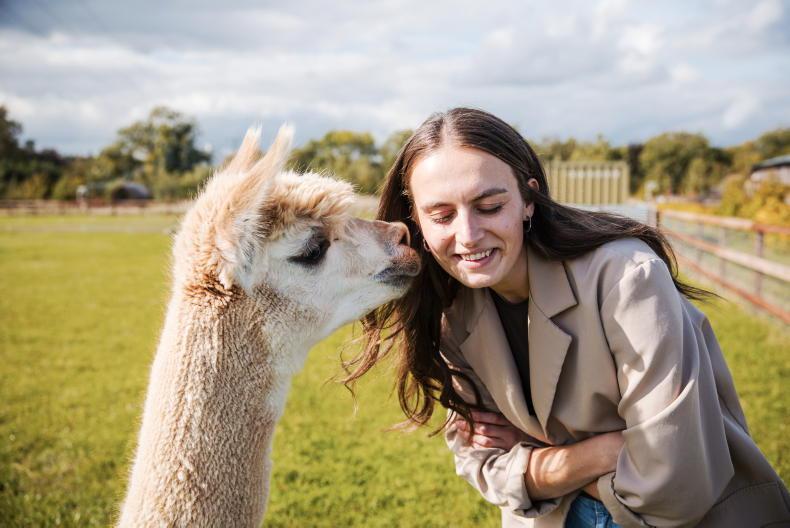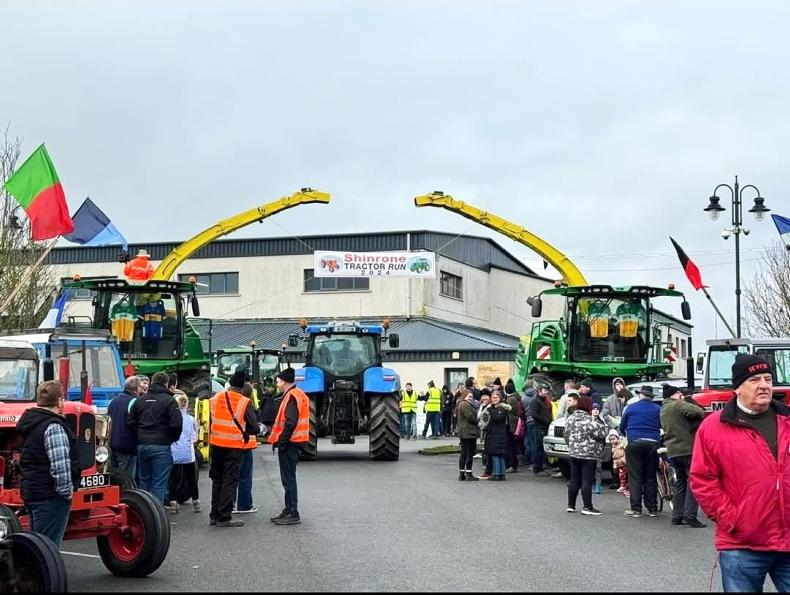It is several days after storm Éowyn, and the road to Kilrush, Co Clare is still littered with debris from fallen trees. ESB workers can be seen working away on the roadsides; a stark reminder of how many rural Irish dwellers (at the time of writing) are still living without electricity. In times like these, all of us lean on these skilled workers, as we also lean on small local businesses.
Aoife Power and Andrew Flood are experiencing both sides of the spectrum – on the day of our visit, they are without power in their Doonbeg home, but their small business, Beag Café, in Kilrush, (beagfood.com) lost power for just one day. They have been able to operate as normal, with a few minor adjustments.
“On the day we lost power, we knew we would lose some stock, so we set up a table on the street and gave away our perishables,” Aoife says. “We hate food waste and would much rather see it eaten than thrown in the bin.”
With said ingredients given away, the pair reopened the next day with a slightly adjusted menu. They made what Andrew called “storm Éowyn specials” for the weekend.
“We were really busy,” he says. “We made a lot of veggie-based stuff, like a Turkish-style chickpea stew with sumac. Our hard cheeses were ok, and our Gubbeen chorizo, so there were a lot of toasties, and we were still able to do all of our baking.”
Aside from handing out food in the street, the community has benefitted from having a café like Beag in its midst. During the mass loss of electricity, locals knew they could come in for hot food, a good cup of coffee and a place to charge their mobile phones.
Beating heart
Cafés and other small food businesses have become the beating heart of rural Irish communities. In the past, it was the pub, but in recent years cafés seem to have surpassed the pub in popularity. Beag Café is living proof of this – in fact, their location, a historic building in the town centre, was once a pub.
“Looking inside the presses, you’ll see dates of births and deaths pencilled in [from years past],” Andrew shows us, smiling. “We didn’t think we would be able to move into a permanent location so quickly after starting our business – this is just how things have gone for us.”
But Beag Café seems to be an outlier when it comes to the current Irish hospitality crisis. After just a year operating in a food truck on the Kilrush marina, Aoife and Andrew’s success led them to their newer brick-and-mortar location in the town centre, which they opened in March, 2024.
“We initially thought we’d be in the food truck for at least five years,” Aoife explains. “And we thought the business might not work in Kilrush and we would have to move elsewhere in the county, like Kilkee. But rent is affordable here and even when we were in the food truck, we only ever ended up moving it a few times for events – we were busy enough on the marina.”
Organic growth
The pair moved to the area (Aoife is originally from Limerick and Andrew, from east Clare) post-pandemic for a healthier pace of life. As musicians, they had spent the previous decade living and working in England where their indie band, whenyoung, had been signed to a major record label. They also spent time working in hospitality and landscape architecture.
“I think the food industry has been better to us,” Aoife says. “There is definitely more of a community in food. We got a record deal in 2017 and then when the pandemic happened, the music industry became a lot more difficult.”
“We were both into food and hospitality, so we decided to give the food truck a go,” Andrew adds. “We started off selling toasties, coffee and buns – we were making everything at home in our kitchen.
“The best thing about moving into the permanent location [aside from having a larger kitchen] is that we now have a space for people to gather,” he continues.
“It’s created more of an identity for us; we’ve been able to curate our style and we recently got a wine licence. Our growth has been organic, most of our marketing has been through social media.”
“We’ve been lucky as well; we have two really reliable employees who just get it,” Aoife says. “We all share out the duties – dishes, front of house, whatever needs doing.”
Things aren’t perfect, of course, and despite an overall positive experience with Beag Café, Aoife and Andrew face similar challenges to other small food businesses. As they move forward, they are committed to taking things slowly, avoiding food waste and being frugal with finances.
We’ve been lucky as well; we have two really reliable employees who just get it. We all share out the duties – dishes, front of house, whatever needs doing.
“For a long time we weren’t really paying ourselves; we were just putting everything we could back into the business,” Aoife says. “But now we’re in a place where we are making an income. To be honest, I think the music industry was a great learner for us as we’ve gone from one precarious industry to another.”
“We do as much as we can ourselves,” Andrew adds. “In terms of the set-up, we did most of the work – we financed everything ourselves. We haven’t been eligible for any grants [small business grants]”– that’s because the enterprise is new.
Aoife and Andrew haven’t yet reached all of their business goals, but say they plan to make small changes as they can afford them. They are committed to the community they have built around themselves – both in the town and with other food producers in the region.
They prioritise using local ingredients in menu items and value their customer base, many of whom have been with them since they were selling toasties from their food truck.
“They and the local producers are the real stars of the business,” Aoife says. “All of the products we use are so good; there is so much going on in this region that isn’t shouted about enough. Our local veg supplier [Sevenacres Farm] is just up the road, our eggs are from Wild Irish Farm Doonbeg, we use Hazel Mountain Chocolate and our bread is from Sourdo’Farrell in Ennis. We’re just combining all of these great flavours to make something delicious.”

Andrew Flood and Aoife Power in Beag, Kilrush, Co Clare. \ Eamon Ward
What can be done?
It’s uplifting to hear stories of success like Aoife and Andrew’s. Unfortunately, of late, we are mostly hearing news of rural food businesses closing down instead of opening up or expanding.
According to Deloitte, Irish corporate insolvency figures for 2024 reached a record 875 – the highest number since 2016. Of these, the vast majority of insolvencies comprised of SMEs (small to medium enterprises), including many hospitality businesses (figures for hospitality were up 60% from 2023).
Last October, Irish Country Living reported on the extreme disappointment which came along with Budget 2025, where it was announced that the VAT rate for hospitality businesses would remain at 13.5% and not lowered to 9%, as was the hope.
This past January, the newly elected Government made a commitment to lower the VAT rate to 9% for food-based hospitality businesses, hairdressing and entertainment, though it is still unclear when this will be implemented.
Lowering the VAT rate is not going to solve the problems of the Irish hospitality industry, but it will reduce financial pressures. Right now, Government-mandated minimum wage increases are putting additional pressure on businesses already dealing with increases in rent, ingredients and overheads.
Keith Darcy is a Kerry-based professional business coach and consultant who specialises in finance (keithdarcy.ie). As a fully certified Qualified Financial Advisor (QFA) and qualified management accountant, he is no stranger to the financial issues commonly seen in business. He says hospitality businesses are really experiencing these at the moment.

Keith Darcy is a hospitality consultant who specialises in finance.
“In my experience there have been several challenges faced by small food businesses in Ireland over the past 12 months,” he says. “These include escalating costs, food safety compliance issues, supply chain disruptions [affecting availability and cost of raw materials], staff shortages, not being able to keep up with technological advancements in the industry and consumer demand fluctuations.”
While things are difficult, Keith believes taking a proactive and positive approach to the day-to-day operations are important.
“Perseverance and resilience are key,” he says. “Challenges are part of the journey, and with the right strategies, you can overcome them and thrive.”
Keith’s practical steps
Keith offers the following advice to help small businesses:
1. Review finances to see where you can cut cost without impacting on quality.
2. Diversify your offering with meal kits, new takeaway options or a new line of free-from foods.
3. Leverage technology by converting to a POS (point of sale) system, online ordering platforms or inventory management software.
4. Build strong customer relationships through loyalty programmes, discounts or personalised experiences.
5. Focus on quality and consistency (the keys to any successful food business).
6. Be flexible and adapt your business model as needed.
7. Provide employees with the support and training necessary to excel in their work.
Local Enterprise Offices (LEO) offer programmes like LEAN Consulting and Green for Business which helps small businesses become more financially and economically sustainable (localenterprise.ie). Obtaining an SEAI energy efficiency grant can help reduce long-term energy costs through retrogrades and updated equipment (seai.ie). There are a number of private hospitality business mentors who can take a deeper look at your business to find any inefficiencies in finance, food or
marketing.Microfinance Ireland (MFI) is a not-for-profit lender which can supply small Irish businesses with loans to help them grow. It can provide loans of up to €50,000 (microfinanceireland.ie). Read more
Lir Seafood: It’s a whole new kettle of fish for seafood lovers
Spilling the beans – Irish roasteries brewing change
It is several days after storm Éowyn, and the road to Kilrush, Co Clare is still littered with debris from fallen trees. ESB workers can be seen working away on the roadsides; a stark reminder of how many rural Irish dwellers (at the time of writing) are still living without electricity. In times like these, all of us lean on these skilled workers, as we also lean on small local businesses.
Aoife Power and Andrew Flood are experiencing both sides of the spectrum – on the day of our visit, they are without power in their Doonbeg home, but their small business, Beag Café, in Kilrush, (beagfood.com) lost power for just one day. They have been able to operate as normal, with a few minor adjustments.
“On the day we lost power, we knew we would lose some stock, so we set up a table on the street and gave away our perishables,” Aoife says. “We hate food waste and would much rather see it eaten than thrown in the bin.”
With said ingredients given away, the pair reopened the next day with a slightly adjusted menu. They made what Andrew called “storm Éowyn specials” for the weekend.
“We were really busy,” he says. “We made a lot of veggie-based stuff, like a Turkish-style chickpea stew with sumac. Our hard cheeses were ok, and our Gubbeen chorizo, so there were a lot of toasties, and we were still able to do all of our baking.”
Aside from handing out food in the street, the community has benefitted from having a café like Beag in its midst. During the mass loss of electricity, locals knew they could come in for hot food, a good cup of coffee and a place to charge their mobile phones.
Beating heart
Cafés and other small food businesses have become the beating heart of rural Irish communities. In the past, it was the pub, but in recent years cafés seem to have surpassed the pub in popularity. Beag Café is living proof of this – in fact, their location, a historic building in the town centre, was once a pub.
“Looking inside the presses, you’ll see dates of births and deaths pencilled in [from years past],” Andrew shows us, smiling. “We didn’t think we would be able to move into a permanent location so quickly after starting our business – this is just how things have gone for us.”
But Beag Café seems to be an outlier when it comes to the current Irish hospitality crisis. After just a year operating in a food truck on the Kilrush marina, Aoife and Andrew’s success led them to their newer brick-and-mortar location in the town centre, which they opened in March, 2024.
“We initially thought we’d be in the food truck for at least five years,” Aoife explains. “And we thought the business might not work in Kilrush and we would have to move elsewhere in the county, like Kilkee. But rent is affordable here and even when we were in the food truck, we only ever ended up moving it a few times for events – we were busy enough on the marina.”
Organic growth
The pair moved to the area (Aoife is originally from Limerick and Andrew, from east Clare) post-pandemic for a healthier pace of life. As musicians, they had spent the previous decade living and working in England where their indie band, whenyoung, had been signed to a major record label. They also spent time working in hospitality and landscape architecture.
“I think the food industry has been better to us,” Aoife says. “There is definitely more of a community in food. We got a record deal in 2017 and then when the pandemic happened, the music industry became a lot more difficult.”
“We were both into food and hospitality, so we decided to give the food truck a go,” Andrew adds. “We started off selling toasties, coffee and buns – we were making everything at home in our kitchen.
“The best thing about moving into the permanent location [aside from having a larger kitchen] is that we now have a space for people to gather,” he continues.
“It’s created more of an identity for us; we’ve been able to curate our style and we recently got a wine licence. Our growth has been organic, most of our marketing has been through social media.”
“We’ve been lucky as well; we have two really reliable employees who just get it,” Aoife says. “We all share out the duties – dishes, front of house, whatever needs doing.”
Things aren’t perfect, of course, and despite an overall positive experience with Beag Café, Aoife and Andrew face similar challenges to other small food businesses. As they move forward, they are committed to taking things slowly, avoiding food waste and being frugal with finances.
We’ve been lucky as well; we have two really reliable employees who just get it. We all share out the duties – dishes, front of house, whatever needs doing.
“For a long time we weren’t really paying ourselves; we were just putting everything we could back into the business,” Aoife says. “But now we’re in a place where we are making an income. To be honest, I think the music industry was a great learner for us as we’ve gone from one precarious industry to another.”
“We do as much as we can ourselves,” Andrew adds. “In terms of the set-up, we did most of the work – we financed everything ourselves. We haven’t been eligible for any grants [small business grants]”– that’s because the enterprise is new.
Aoife and Andrew haven’t yet reached all of their business goals, but say they plan to make small changes as they can afford them. They are committed to the community they have built around themselves – both in the town and with other food producers in the region.
They prioritise using local ingredients in menu items and value their customer base, many of whom have been with them since they were selling toasties from their food truck.
“They and the local producers are the real stars of the business,” Aoife says. “All of the products we use are so good; there is so much going on in this region that isn’t shouted about enough. Our local veg supplier [Sevenacres Farm] is just up the road, our eggs are from Wild Irish Farm Doonbeg, we use Hazel Mountain Chocolate and our bread is from Sourdo’Farrell in Ennis. We’re just combining all of these great flavours to make something delicious.”

Andrew Flood and Aoife Power in Beag, Kilrush, Co Clare. \ Eamon Ward
What can be done?
It’s uplifting to hear stories of success like Aoife and Andrew’s. Unfortunately, of late, we are mostly hearing news of rural food businesses closing down instead of opening up or expanding.
According to Deloitte, Irish corporate insolvency figures for 2024 reached a record 875 – the highest number since 2016. Of these, the vast majority of insolvencies comprised of SMEs (small to medium enterprises), including many hospitality businesses (figures for hospitality were up 60% from 2023).
Last October, Irish Country Living reported on the extreme disappointment which came along with Budget 2025, where it was announced that the VAT rate for hospitality businesses would remain at 13.5% and not lowered to 9%, as was the hope.
This past January, the newly elected Government made a commitment to lower the VAT rate to 9% for food-based hospitality businesses, hairdressing and entertainment, though it is still unclear when this will be implemented.
Lowering the VAT rate is not going to solve the problems of the Irish hospitality industry, but it will reduce financial pressures. Right now, Government-mandated minimum wage increases are putting additional pressure on businesses already dealing with increases in rent, ingredients and overheads.
Keith Darcy is a Kerry-based professional business coach and consultant who specialises in finance (keithdarcy.ie). As a fully certified Qualified Financial Advisor (QFA) and qualified management accountant, he is no stranger to the financial issues commonly seen in business. He says hospitality businesses are really experiencing these at the moment.

Keith Darcy is a hospitality consultant who specialises in finance.
“In my experience there have been several challenges faced by small food businesses in Ireland over the past 12 months,” he says. “These include escalating costs, food safety compliance issues, supply chain disruptions [affecting availability and cost of raw materials], staff shortages, not being able to keep up with technological advancements in the industry and consumer demand fluctuations.”
While things are difficult, Keith believes taking a proactive and positive approach to the day-to-day operations are important.
“Perseverance and resilience are key,” he says. “Challenges are part of the journey, and with the right strategies, you can overcome them and thrive.”
Keith’s practical steps
Keith offers the following advice to help small businesses:
1. Review finances to see where you can cut cost without impacting on quality.
2. Diversify your offering with meal kits, new takeaway options or a new line of free-from foods.
3. Leverage technology by converting to a POS (point of sale) system, online ordering platforms or inventory management software.
4. Build strong customer relationships through loyalty programmes, discounts or personalised experiences.
5. Focus on quality and consistency (the keys to any successful food business).
6. Be flexible and adapt your business model as needed.
7. Provide employees with the support and training necessary to excel in their work.
Local Enterprise Offices (LEO) offer programmes like LEAN Consulting and Green for Business which helps small businesses become more financially and economically sustainable (localenterprise.ie). Obtaining an SEAI energy efficiency grant can help reduce long-term energy costs through retrogrades and updated equipment (seai.ie). There are a number of private hospitality business mentors who can take a deeper look at your business to find any inefficiencies in finance, food or
marketing.Microfinance Ireland (MFI) is a not-for-profit lender which can supply small Irish businesses with loans to help them grow. It can provide loans of up to €50,000 (microfinanceireland.ie). Read more
Lir Seafood: It’s a whole new kettle of fish for seafood lovers
Spilling the beans – Irish roasteries brewing change











SHARING OPTIONS